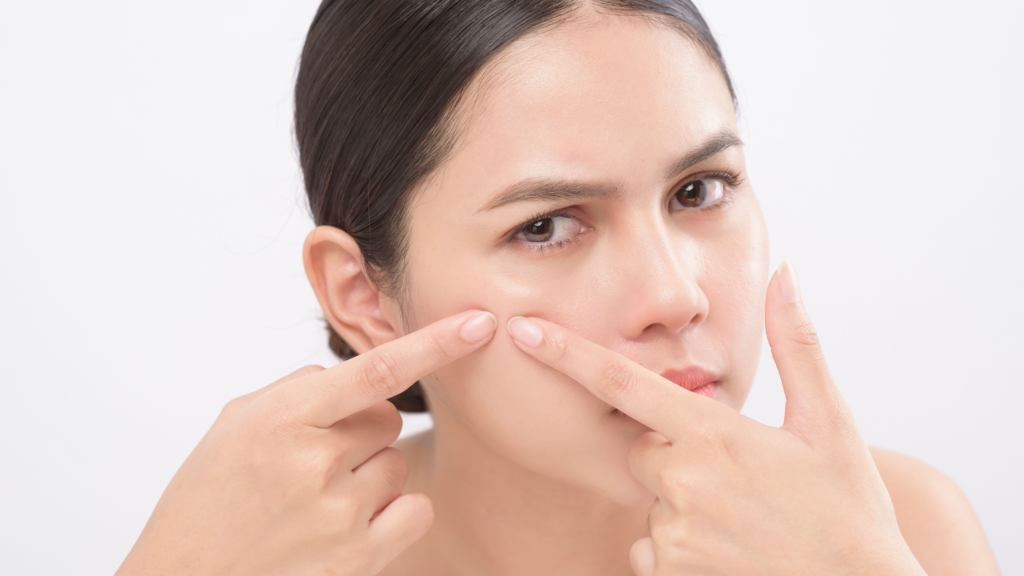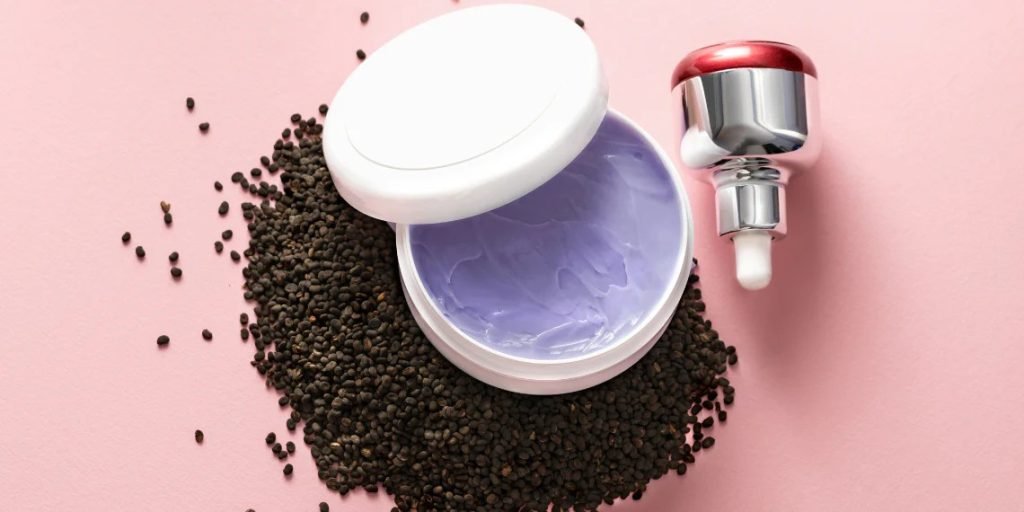[ad_1]
Acne is a common skin condition that affects millions of people worldwide, especially during adolescence. While there are various treatments available for acne, some people turn to natural remedies, including vitamin C. But does vitamin C really help acne? In this blog post, we’ll review the evidence and discuss whether vitamin C is a useful treatment for acne.
First, let’s understand what acne is and what causes it.
Acne occurs when hair follicles become clogged with oil and dead skin cells. This can result in pimples, blackheads and whiteheads. Hormonal changes, genetics and certain medications can contribute to the development of acne.
What is vitamin C?
Vitamin C, also known as ascorbic acid, is a water-soluble vitamin that plays a vital role in many of the body’s functions. It is an essential nutrient, meaning the body cannot produce it on its own and must be obtained through diet or supplements.
Vitamin C is found in many fruits and vegetables, such as oranges, strawberries, kiwi, broccoli and red peppers. It is involved in the synthesis of collagen, which is essential for skin, bones, joint health and wound healing.
How does vitamin C help acne?
Vitamin C can help with acne in several ways. One of the main ways it can help is by reducing inflammation and oxidative stress in the skin.
- Inflammation and oxidative stress are thought to play a role in the development of acne. Vitamin C is a powerful antioxidant that can neutralize free radicals and protect the skin from damage. By reducing oxidative stress, vitamin C can help reduce inflammation and prevent new acne from forming.
- Another way vitamin C can help with acne is by supporting collagen synthesis. Collagen is a protein that is essential for skin health and helps keep skin firm and elastic. Vitamin C is necessary for collagen production, so it can help support the skin’s natural healing process and reduce the appearance of acne scars.
- Finally, vitamin C can also help regulate sebum production. Sebum is an oily substance produced by the sebaceous glands of the skin, and excess sebum can contribute to the development of acne. Vitamin C can help regulate sebum production by reducing inflammation in the sebaceous glands and balancing hormone levels.
How to use vitamin C
There are several ways to use vitamin C, depending on your individual needs and preferences. Here are some common ways to use vitamin C:
Dietary sources: One of the easiest ways to get vitamin C is through your diet. Many fruits and vegetables, such as oranges, strawberries, kiwi, broccoli and red peppers are rich in vitamin C. By including these foods in your diet, you can help support skin health and overall well-being.
Supplements: If you are unable to get enough vitamin C through your diet, supplements can be a good alternative. Vitamin C supplements are available in various forms, including tablets, capsules, and powders. It’s important to talk to your healthcare provider before starting any new supplement, as they can help you determine the right dosage and make sure it won’t interact with any medications you’re taking.
Current products: Vitamin C is also available in topical skin care products, such as serums and creams. These products can help brighten skin, reduce the appearance of dark spots and acne scars, and improve overall skin texture. It is important to choose a product that contains a stable form of vitamin C, such as L-ascorbic acid, and follow the directions carefully to avoid skin irritation or other adverse effects.
DIY recipe: You can also make your own vitamin C serum at home using vitamin C powder and other ingredients. However, it is important to be careful when making DIY skin care products, as improper formulation can lead to skin irritation or other adverse effects. It is recommended that you do thorough research and follow a reputable prescription or seek advice from a skin care professional.

How long does vitamin C take to clear up acne?
The amount of time it takes for vitamin C to clear acne can vary depending on the severity of the acne and other factors such as the individual’s skin type, diet, and lifestyle habits.
That being said, some people may begin to see improvements in their acne within a few weeks of starting to use vitamin C supplements or topical products.
This may be due to the anti-inflammatory and antioxidant properties of vitamin C, which can help reduce inflammation and prevent new acne from forming.
It’s also worth noting that individual results may vary and it may take longer for some people to see improvements in their acne than others.
DOES VITAMIN C HELP ACNE?
Given that vitamin C is anti-inflammatory, it can help reduce the redness and swelling associated with acne when used topically. Thus, it can improve the appearance of acne lesions.
In a 12-week study of 50 people, 61% of participants who used a lotion containing 5% sodium ascorbyl phosphate (SAP) – experienced significant improvement in acne lesions, compared to a control group.
In a smaller, 8-week study of 30 people, those who used 5% SAP had a 48.8% reduction in acne lesions. Additionally, those who used a combination of SAP and 2% retinol—a vitamin A derivative—had a 63.1% reduction.
Although these results are promising, larger, high-quality studies are needed.
Evidence on the effectiveness of vitamin C for treating acne is still limited, and more research is needed to confirm its benefits.
There is also some evidence to suggest that vitamin C may help regulate sebum production. Sebum is an oily substance produced by the sebaceous glands of the skin, and excess sebum can contribute to the development of acne. Vitamin C can help balance hormone levels and reduce inflammation.
CAN VITAMIN C CURE ACNE Pimples?
Vitamin C has the potential to improve the appearance of acne scars, but it may not completely eliminate them, especially in the case of deep or extensive scars. The benefits of vitamin C for treating acne scars come from its various properties:
Collagen production: Vitamin C is vital for the synthesis of collagen, a protein that supports skin structure and healing. By promoting collagen production, vitamin C can help improve skin texture and firmness, which can help reduce some types of acne scars.
Skin lightening: Vitamin C is known for its ability to even out skin tone and reduce hyperpigmentation. This can help fade the blemish that often accompanies acne scars, making them less noticeable.
Anti-inflammatory effects: The anti-inflammatory properties of vitamin C can help reduce the redness and inflammation associated with certain types of wounds.
Antioxidant protection: As an antioxidant, vitamin C helps protect the skin from damage caused by free radicals, which can contribute to skin aging and scarring.
While topical vitamin C products can be helpful, it’s important to have realistic expectations. Acne scars vary widely in type, depth, and severity, and there is no one-size-fits-all solution. Vitamin C is most likely to be effective for mild to moderate acne scars and pigmentation issues.
For severe or deeply scarred scars, more advanced treatments such as laser therapy, chemical peels, microdermabrasion, or dermal fillers may be necessary for more significant improvement.
SIDE EFFECTS OF VITAMIN C
Topical vitamin C products are generally safe for most people, but in some cases, they can cause mild to moderate side effects, including:
Skin irritation: Topical vitamin C can cause redness, itching and dryness, especially in people with sensitive skin. It is important to start with a low concentration and gradually increase the frequency of use to minimize the risk of skin irritation.
Allergic reactions: Some people may be allergic to vitamin C or other ingredients in topical products, which can cause itching, swelling, and redness.
Sun sensitivity: Topical vitamin C can make the skin more sensitive to the sun, increasing the risk of sunburn and skin damage. It is important to use sunscreen and limit sun exposure while using vitamin C products.
Coloring: Some forms of vitamin C, such as ascorbic acid, can stain clothes or towels, so it’s important to allow the product to fully absorb into the skin before getting dressed or using a towel.
Oxidation: Vitamin C can degrade over time, especially when exposed to air and light, which can reduce its effectiveness. It is important to store vitamin C products in a cool, dark place and use them within the expiration date.
It is important to note that most people can use topical vitamin C products safely and without side effects. If you experience any adverse effects while using vitamin C products, discontinue use and consult a healthcare provider or dermatologist.
CONCLUSION
Vitamin C can help improve acne by reducing inflammation, preventing bacterial growth, and boosting collagen production. While there is limited scientific evidence to support the effectiveness of vitamin C for treating acne, some studies have shown promising results.
Topical vitamin C products can be especially beneficial for acne-prone skin, as they can help reduce inflammation, protect against oxidative stress, and improve the appearance of acne scars.
However, it is important to use vitamin C products as part of a comprehensive skin care regimen that includes other treatments, such as retinoids and salicylic acid, and to follow a healthy lifestyle that includes a balanced diet, regular exercise regular and stress management.
It’s also important to note that vitamin C may not work for everyone and results may vary depending on the severity and underlying causes of your acne.
If you’re considering using vitamin C for acne, it’s important to talk to a healthcare provider or dermatologist to determine the right dosage and make sure it’s safe for you to use.
spring
Vitamin C for Acne: Benefits and Uses
[ad_2]







